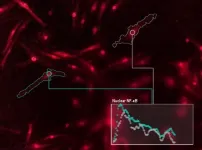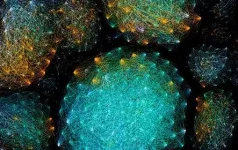New research may explain shortages in STEM careers
The study focuses on students who change plans within the pipeline
2021-05-12
(Press-News.org) A new study by the University of Georgia revealed that more college students change majors within the STEM pipeline than leave the career path of science, technology, engineering and mathematics altogether.
Funded by a National Institutes of Health grant and a National Science Foundation Postdoctoral Fellowship and done in collaboration with the University of Wisconsin, the study examined interviews, surveys and institutional data from 1,193 students at a U.S. midwestern university for more than six years to observe a single area of the STEM pipeline: biomedical fields of study.
Out of 921 students who stayed in the biomedical pipeline through graduation, almost half changed their career plans within the biomedical fields.
"This was almost double the number of students who left biomedical fields altogether," said Emily Rosenzweig, co-author of the study and assistant professor in the Mary Frances Early College of Education's department of educational psychology. "This suggests that if we want to fully understand why there are shortages in certain STEM careers, we need to look at those who change plans within the pipeline, not just those who leave it."
Rosenzweig examined students' motivations for changing career plans and found that students were more often inspired to make a change because a new field seemed more attractive.
This finding pointed to an underexplored research area that educators, policymakers and administrators should devote more attention to in the future. Rather than focusing only on what makes students disenchanted with a particular career, factors that make alternative career paths seem valuable to students need to be considered.
"The sheer number of changes made by students who remained in the biomedical pipeline highlights the divergence of paths students take in their career decision-making," Rosenzweig said. "We should not simply assume that students are staying on course and progressing smoothly toward intended careers just because they have not left the [STEM] pipeline."
Ultimately, the research provides new insights about students' motivations for choosing various careers inside the STEM pipeline and demonstrates the importance of understanding this group if schools are to promote retention in particular STEM careers.
INFORMATION:
ELSE PRESS RELEASES FROM THIS DATE:
2021-05-12
UCLA life scientists have identified six "words" that specific immune cells use to call up immune defense genes -- an important step toward understanding the language the body uses to marshal responses to threats.
In addition, they discovered that the incorrect use of two of these words can activate the wrong genes, resulting in the autoimmune disease known as Sjögren's syndrome. The research, conducted in mice, END ...
2021-05-12
A new study from North Carolina State University finds that greenhouse gas (GHG) emissions from standing dead trees in coastal wetland forests - colloquially called "tree farts" - need to be accounted for when assessing the environmental impact of so-called "ghost forests."
In the study, researchers compared the quantity and type of GHG emissions from dead tree snags to emissions from the soil. While snags did not release as much as the soils, they did increase GHG emissions of the overall ecosystem by about 25 percent. Researchers say the findings show snags are important for understanding the total environmental impact of the spread of dead trees in coastal wetlands, known as ghost forests, ...
2021-05-12
The immune system's main job is identifying things that can make us sick. In the language of immunology, this means distinguishing "self" from "non-self": The cells of our organs are self, while disease-causing bacteria and viruses are non-self.
But what about the billions of bacteria that live in our guts and provide us with benefits like digesting food and making vitamins? Are they friend or foe?
This isn't only a philosophical question. An immune system that mistakes our good gut bacteria for an enemy can cause a dangerous type of inflammation in the intestines called colitis. An immune system that looks the other way while gut microbes spill past their assigned borders is equally dangerous. Understanding ...
2021-05-12
Our body's relationship with bacteria is complex. While infectious bacteria can cause illness, our gut is also teaming with "good" bacteria that aids nutrition and helps keep us healthy. But even the "good" can have bad effects if these bacteria end up in tissues and organs where they're not supposed to be.
Now, research published in END ...
2021-05-12
COLUMBUS, Ohio - Neighborhoods without opioid treatment providers likely serve as a widespread barrier to care for those who are ready to seek help, a new study has found.
The study, led by researchers at The Ohio State University, appears today (May 12, 2021) in the journal PLOS ONE.
"The study identified clear opioid treatment deserts that undoubtedly stand in the way of access to needed care and that likely exist throughout the state and the nation. These are areas where treatment providers should be setting up shop - we need a surge of resources into these areas," said Ayaz Hyder, an assistant professor in Ohio State's College of Public Health ...
2021-05-12
Elephant Seals' Extreme Diving Allows Them to Exploit Deep Ocean Niche
Using data captured by video cameras and smart accelerometers attached to female elephant seals, Taiki Adachi and colleagues show that the animals spend at least 80% of their day foraging for fish, feeding between 1,000 and 2,000 times per day. The unique glimpse at elephant seal foraging strategy shows how these large marine mammals exploit a unique ocean niche filled with small fish. The findings also may offer a way to monitor the health of the mesopelagic zone, the dark and cold ocean "twilight zone" ecosystem at 200 to 1,000 meters deep. Small mesopelagic fish dominate the world's ocean ...
2021-05-12
A Johns Hopkins University-led team has created an inexpensive portable device and cellphone app to diagnose gonorrhea in less than 15 minutes and determine if a particular strain will respond to frontline antibiotics.
The invention improves on traditional testing in hospital laboratories and clinics, which typically takes up to a week to deliver results--time during which patients can unknowingly spread their infections. The team's results appear today in Science Translational Medicine.
"Our portable, inexpensive testing platform has the potential to change the game when it comes to diagnosing and enabling rapid treatment of sexually transmitted infections," said team leader Tza-Huei Wang, a professor of mechanical engineering ...
2021-05-12
People who are genetically more likely to suffer from cardiovascular diseases may benefit from boosting a biomarker found in fish oils, a new study suggests.
In a genetic study in 1,886 Asian Indians published in PLOS ONE today (Wednesday 12 May), scientists have identified the first evidence for the role of adiponectin, an obesity-related biomarker, in the association between a genetic variation called omentin and cardiometabolic health.
The team, led by Professor Vimal Karani from the University of Reading, observed that the role of adiponectin was linked to cardiovascular disease markers that were independent of common and central obesity among the Asian Indian population. ...
2021-05-12
Misleading claims about COVID-19 vaccines can negatively impact public confidence in immunisation uptake, a new UNSW Sydney study reveals.
A new study published in the scientific journal PLOS ONE revealed over 103 million people globally liked, shared, retweeted or reacted with an emoji to misinformation and conspiracy theories about COVID-19 vaccines.
In 2020, a social media post claiming, "a new vaccine for COVID-19 will alter a person's DNA and result in them becoming genetically modified" was circulated on Facebook accounts in Australia. Up until August 21, 2020, this false claim had attracted 360 shares and was viewed 32,000 times.
The study, led by UNSW researchers, ...
2021-05-12
Quick: Pick your three favorite fast-food restaurants.
If you're like many people, McDonald's, Wendy's, and Burger King may come to mind--even if you much prefer In-N-Out or Chick-fil-A.
A new study from UC Berkeley's Haas School of Business and UC San Francisco's Department of Neurology found that when it comes to making choices, we surprisingly often forget about the things we like best and are swayed by what we remember. The paper, publishing this week in the journal Proceedings of the National Academy of Sciences, combines insights from economics and psychology with decision-making experiments and fMRI brain scans to examine how our imperfect memories affect our decision making.
"Life is not a multiple-choice test," says Berkeley ...
LAST 30 PRESS RELEASES:
[Press-News.org] New research may explain shortages in STEM careers
The study focuses on students who change plans within the pipeline

